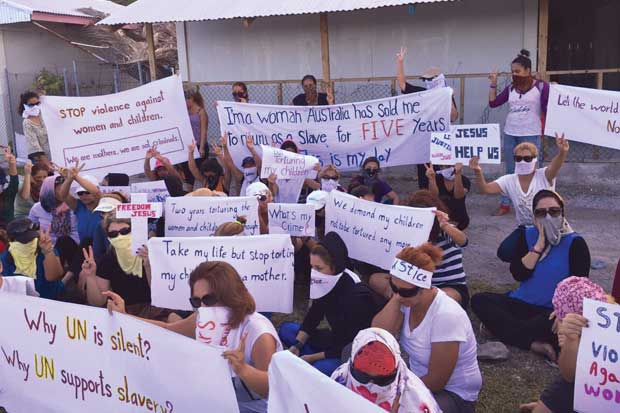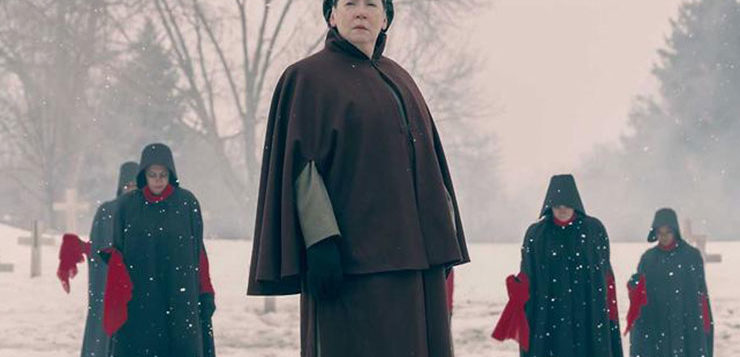The promise of sanctuary offered to Gilead’s refugees on arrival across the border is a sad fiction for real women fleeing persecution in today’s world, writes Katie Robertson.
This season of The Handmaid’s Tale has made for brutally compelling viewing. Edge of your seat, white knuckled, gut-wrenching viewing.
The attempts by the lead characters to flee Gilead throughout the series have been some of the most agonising and suspenseful plot lines to endure. Each time we thought a pregnant June might just make it we’ve been left shaken and deflated (not least when she divided viewers by refusing to get into the escape vehicle in last week’s season finale).
We share Emily’s elated disbelief as she realises she’s going to get out. We held our breath last season as Moira made the final sprint over the Canadian border and slumped down with exhausted relief in the snow.
These women endure unspeakable horror, violence and repression Under His Eye. But if there’s one glimmer of hope that exists throughout the monotonous brutality of The Handmaid’s Tale, it is the characters’ ever-present assumption that sanctuary can be found in a fictionalised neighbouring Canada, if only they can make it across the border.
But what if this assumption was wrong? What if the Handmaids were prevented from crossing the border, not by the Guardians of Gilead but by the Canadian Border Force, mandated to push them back from where they came? Or if they did manage to make it across they were immediately imprisoned on their arrival, separated from their children or forcibly removed and indefinitely detained on a small desolate island in the middle of the ocean?

There’s no doubting this adaption of Margaret Atwood’s 1985 novel has resonated with huge audiences, particularly women, who have been both captured and horrified by the eerie dystopian world it so masterfully depicts. The show grips us so tightly because although Gilead seems alien at first glance, the gradual changes that we see evolving in pre-Gilead America are frighteningly recognisable.
The previous lives of June, Moira, Emily and the other Handmaids are relatable to many of us. Their struggle under dystopian rule becomes our struggle. That couldn’t happen to us. Could it?
And yet while we relate to the plight of these characters from the comfort of our lounge rooms, we fail to make the obvious link to the Junes, Moiras and Emilys of the real world.
The assumption that refuge will be offered on arrival to those fleeing persecution and violence in Australia and many other countries around the world is sadly a fiction. Women who have attempted to land on our shores seeking safety in recent years have either been turned back on the high seas, or immediately detained and then forcibly removed to Nauru, a remote Micronesian island thousands of kilometres away.
The island’s former name of ‘Pleasant Island’ is cruelly misleading. Consistent evidence documented in numerous reports has exposed some of the unspeakable horrors women have been subjected to in detention on this island. Allegations of rape, sexual assault and sexual harassment in the form of being propositioned by guards for sexual favours in exchange for cigarettes or longer showers are but a few examples.
The captivating power of The Handmaid’s Tale is the way it has connected with audiences – especially women, who identify with the characters and feel their fear and desperation to escape the oppression and violence of Gilead. What’s missing from this sense of connection is a logical extension of empathy to the real Junes, Moiras and Emilys of this world – especially those who have dared to ask Australia for protection.
While the plight of the female characters in The Handmaid’s Tale makes for harrowing viewing, at least there is the ever-present promise of safety in the form of a neighbouring country of sanctuary – if only they can get there.
Sadly, June, Moira and Emily wouldn’t be so lucky if they made it to our shores.
Donate To New Matilda
New Matilda is a small, independent media outlet. We survive through reader contributions, and never losing a lawsuit. If you got something from this article, giving something back helps us to continue speaking truth to power. Every little bit counts.




